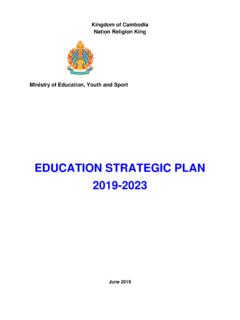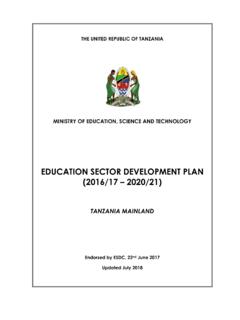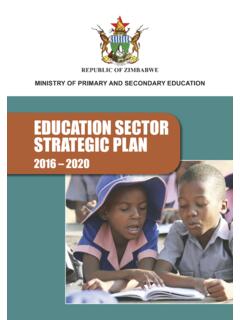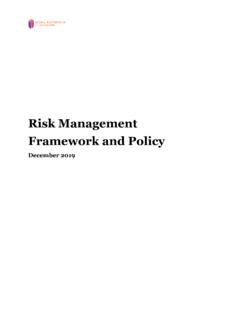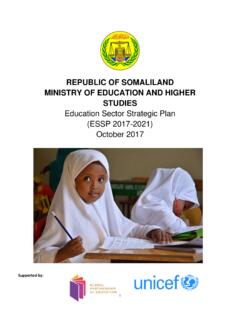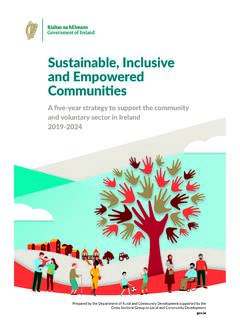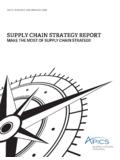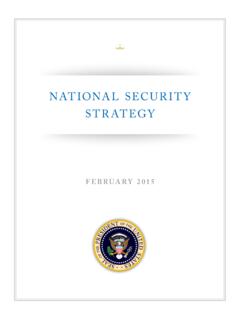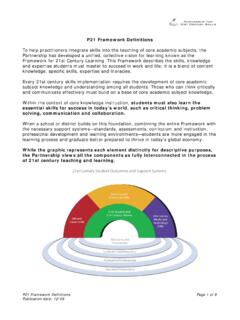Transcription of EDUCATION STRATEGIC PLAN - Global Partnership for …
1 Ministry of EducationGHANA2018 EDUCATION STRATEGIC PLAN 2018 - 2030 EDUCATION STRATEGIC Plan 2018 2030 i Foreword Building on Ghana's achievements in expanding EDUCATION , the EDUCATION STRATEGIC Plan sets out the vision and policies for realising the ambition of transforming Ghana into a learning nation'. It recognises the strengths and weaknesses of the current system and prescribes strategies to address the challenges in order to give every Ghanaian child the opportunity to succeed and contribute to national development. The EDUCATION STRATEGIC Plan 2018-2030 puts Ghana on the road towards meeting the Sustainable Development Goals and represents a deliberate reorientation towards this aim, as it replaces the previous ESP 2010-2020.
2 This plan not only sets the long term vision but also how this will be operationalised in the medium term through the accompanying EDUCATION Sector Medium Term Development Plan 2018-2021. These two documents have both been informed by extensive analysis, which includes the Equity, System Capacity and Cost and Finance Analysis commissioned specifically for the ESP, as well as a broad range of evidence and research produced by partners and the Ministry. This comprehensive evidence base is brought together in the EDUCATION Sector Analysis 2018 and summarises the challenges to which the strategies in the ESP are designed to respond. A lot of time and effort have brought us to this stage and the Ministry of EDUCATION is very grateful to all those who have contributed to the process.
3 This mission to develop an ESP covering the SDGs timespan began in 2016. The process faced various set-backs and has taken the hard work of many people to bring to successful completion. There has been wide consultation and collaboration with partners, ensuring a participatory process that has spanned the entire country. The end result is testament to the perseverance of everyone involved and the Ministry of EDUCATION 's determination to have a plan that will drive the agenda in EDUCATION . It is my expectation that the ESP will be a working document that is embedded in our planning processes from the district to the national level and will shape the future of Ghanaian EDUCATION to achieve better learning outcomes for national development.
4 Dr Matthew Opoku Prempeh (MP) Hon. Minister of EDUCATION The ESP 2018-2030 revolves around the ambition to improve the quality of EDUCATION for all in Ghana. Every sub-sector of the EDUCATION system has a STRATEGIC goal and is based on three policy objectives. these are i} improved equitable access to and participation in inclusive EDUCATION at all levels, ii} improved quality of teaching and learning and STEM at all levels iii} sustainable and efficient management, financing and accountability of EDUCATION service delivery. With so many possibilities for how to achieve these objectives, some careful prioritisation has been necessary. The lens used for this centred on the impact of a strategy or activity on: learning outcomes, accountability for learning outcomes, and equity.
5 These underline Ghana's serious commitment to improving the quality of EDUCATION and ensuring that every child benefits from this. EDUCATION STRATEGIC Plan 2018 2030 ii EDUCATION STRATEGIC Plan 2018 2030 Acknowledgements This EDUCATION STRATEGIC Plan (ESP) 2018 2030 was developed alongside the EDUCATION Sector Analysis (ESA) 2018 and the EDUCATION Sector Medium-Term Development Plan (ESMTDP) 2018 2021. All three documents were developed under the leadership of the Ministry of EDUCATION (MOE) and supported by the agencies of the MOE. The documents benefited from the contributions of numerous individuals and teams who supported with analysis and drafting, as well as providing oversight and STRATEGIC direction.
6 Development partners and other stakeholders also shared qualitative and quantitative data and literature to inform the process and gave significant amounts of time to contribute to and guide the process. The MOE is extremely grateful to all those who have supported the process. In particular, special thanks and acknowledgement go to the Chief Director of the MOE, Enoch Cobbinah, and to Ernest Wesley Otoo and Caitlin Williams at the Ministry, who led this process on behalf of the Honourable Minister of EDUCATION . In addition, the MOE would like to acknowledge the contributions to the development of the ESP, along with the ESA and ESMTDP, that was provided by the drafting team (George Afeti, Jophus Anamuah-Mensah, Clifford Tagoe, Natasha Somji, Mark Todd, and Mike Kiernan); the equity and system capacity analysis team (Fran ois Leclercq, Eric Ananga, Sue Kageler, and Michael Danquah), and the cost and finance team (Philip Cole, John Grey, Abdul-Gafaru Abdulai, and Helen Perry).
7 The analysis provided by these teams underpins the ESA, ESP, and ESMDTP, and as such underpins the future direction of the EDUCATION sector in Ghana. Oversight and STRATEGIC direction of the development of the ESP was provided by the MOE Steering Committee, the ESP Technical Team, development partners, and the EDUCATION Sector Working Group. Thanks also go to those who contributed to shaping this document during consultations, including at the consultation meetings in Kumasi, Tamale, and Accra in December 2017. Special thanks go to the Global Partnership for EDUCATION (GPE) for supporting this process through the provision of funding, to Josephine Lutta at the GPE for her guidance, and to Alberto Begue who carried out the appraisal process and gave insightful and supportive feedback that enabled the documents to be completed.
8 The MOE would also like to thank the UK Department for International Development (DFID) for acting as the grant agent for the GPE grant, and in particular Janice Dolan, Bea Natzler, and Kate Jefferies, who worked alongside the MOE to complete the process. Finally, thanks go to the United States Agency for International Development (USAID), and James Dobson in particular, for acting as the coordinating agency throughout the process. iii EDUCATION STRATEGIC Plan 2018 2030 iv Table of contents Foreword ii Acknowledgements iii List of acronyms vi List of figures xi List of tables xii Executive summary xiii Introduction 1 1 Key features of the ESA 2018 3 Context of Ghana 3 EDUCATION finance 4 EDUCATION management 4 Basic EDUCATION 5 Secondary EDUCATION 7 TVET 8 Inclusive and special EDUCATION 8 NFE 9 Tertiary 10 Wider policy context 10 2 Policy framework of the ESP 13 ESP development process 13 Development of the ESP 13 Reform agenda and EDUCATION sector priorities 19 Alignment of the ESP with national and international goals 20 3 Sub-sector policy objectives.
9 Key issues, and strategies 21 Basic EDUCATION Improved equitable access to and participation in quality basic EDUCATION 21 Secondary EDUCATION Improved equitable access to and participation in quality SHS EDUCATION 30 TVET Strengthened competency-based skills development in TVET 37 NFE Improved opportunities for non-literate youth and adults to have free access to meaningful quality EDUCATION and training 43 Inclusive and special EDUCATION Improved access for PWD, the vulnerable, and the talented 47 Tertiary EDUCATION Improved access to world-class tertiary EDUCATION 54 EDUCATION management Improved planning and management efficiency in the delivery of EDUCATION 61 4 ESP projected resources and costs 69 EDUCATION sector projected resources 2018 2021 69 EDUCATION STRATEGIC Plan 2018 2030 v Cost projections 72 External support for the ESP 86 5 M&E framework 89 Basic EDUCATION indicators 89 Secondary EDUCATION indicators 93 TVET indicators 96 NFE indicators 97 Inclusive and special EDUCATION indicators 99 Tertiary EDUCATION indicators 101 EDUCATION management indicators 103 Accountability and reporting
10 Structures 105 Key tools for effective implementation and M&E 110 Risk factors and remediation 111 6 Communications strategy 113 References 115 Annex A EDUCATION Reform Delivery Framework in Ghana 116 Background 116 The EDUCATION Reform Delivery Framework 118 Structure and staffing of the EDUCATION Reform Delivery Framework 120 Annex B ESP development process 121 Annex C Mapping strategies in NMTDF 2018 2021 to sub-policy objectives of the ESP 123 Annex D Mapping SDG targets to sub-policy objectives of the ESP 131 Annex E Mapping African Union STRATEGIC objectives to sub-policy objectives of the ESP 136 EDUCATION STRATEGIC Plan 2018 2030 vi List of acronyms ABFA Annual Budget Funding Amount ADEOP Annual District EDUCATION Operational Plan AU African Union BECE Basic EDUCATION Certification Examination BED Basic EDUCATION Division CBE Complementary Basic EDUCATION CBT Competency Based Training CENDLOS Centre for National Distance Learning and Open Schooling COE College of EDUCATION COLTEK College of Technology EDUCATION Kumasi COTVET Council for TVET CPD Continuous Professional Development CSO Civil society organisation CSSPS Computerised School Selection and Placement System DA District Assembly DACF District Assemblies Common Fund DDE District Director of EDUCATION DEO District EDUCATION Office DEOC
